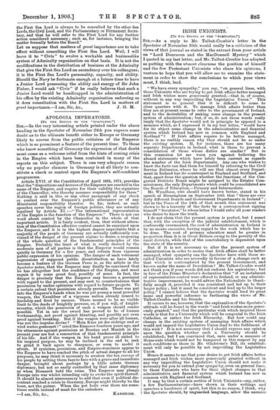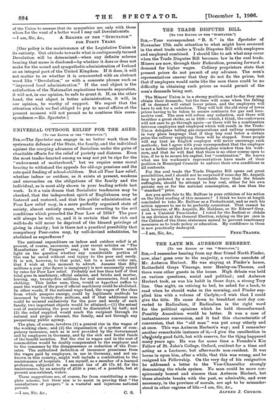IRISH UNIONISTS.
LTO TIIR EDITOR OR TDB " SPEOTATOR.".1
SIR,—A8 a reply to Mr. Talbot-Orosbie's letter in the Spectator of November 10th would really be a criticism of the views of that journal as stated in the extract from your article on "Lord Dunraven and the MaoDonnell Mystery" which I quoted in my last letter, and Mr. Talbot-Orosbie has adopted as putting with the utmost clearness the position of himself and the few Protestant Unionists who share his opinions, I venture to hope that you will allow me to examine the state- ment in order to show the conclusions to which your views must, I think, lead.
"We have every sympathy," you say, "on general lines, with those Unionists who are trying to get Irish affairs better managed and Irish wishes more generously granted,—that is, of course, without in any way imperilling the Legislative Union." This statement is so general that it is difficult to come to close quarters with it. To manage Irish affairs better than they are at present seems to refer to the government of Ireland, and to the desirability of making some change in the present system of administration ; but, if so, do not these words really imply that the Spectator would not in principle be opposed to a measure which, as I expressed it in my last letter, "would have for its object ROM change in the administrative and financial system which Ireland has now in common with England and Scotland " ? If Irish affairs require to be better managed, there is no earthly reason why they should not be so under the existing system. If, for instance, there are too many separate Departments in Ireland, what is there to prevent a consolidation of those whose duties are similar ? But in this connexion let. me warn you against believing the absurd statements which have lately been current as regards the number of the Irish Departments. Any one who wishes to know the facts can find them for himself by referring to the Civil Service Estimates, where he will see that almost every Depart- ment in Ireland has its counterpart in England and Scotland, and that, apart from the question whether the functions of the Con- gested Districts Board might be assigned to the Estates Com- missioners, the only Departments which could be consolidated are the Boards of Education,—Primary and Intermediate.
Mr. Wyndham, who should have known better, stated in his speech at Birmingham on September 10th that 'there are over forty different Boards and Government Departments in Ireland " ; but in the Times of the 14th of that month this statement was shown to be a travesty of the facts by a correspondent signing himself " Scrutator," to whose letter I would refer all your readers who desire to know the truth.
I do not claim that the present system is perfect, but I assert that, with the exception of the judicial establishment, which is confessedly overmanned, the cost of administration in Ireland is by no means excessive, having regard to the work which has to be done. The cost of primary education must be greater in proportion than it is in Great Britain owing to the poverty of the rural districts, while that of the constabulary is dependent npon the state of the country.
But if it is not necessary to alter the present system of administration in order to secure that Irish affairs shall be better managed, what sympathy can the Spectator have with those so- called Unionists who are avowedly in favour of a change such as that which is contemplated by the present Government, and known under the name of Devolution ? Mr. Talbot-Crosbie would not thank you if your words did not endorse his aspirations ; but in face of the Prime Minister's declaration that "if an instalment of representative control were offered to Ireland, or any adminis- trative improvement, he would advise the Nationalists to thank- fully accept it, provided it was consistent and led up to their larger policy ; but it must be consistent and lead up to the larger policy," I cannot believe that the Spectator would lend its great name and powerful influence to furthering the views of Mr. Talbot-Crosbie and his friends.
It occurs to me, however, that the explanation of the Spectator's attitude will be found in the words "and Irish wishes more gener- ously granted," and that the particular wish which inspired these words is that for a University which will be congenial to the Irish Catholics, or rather the Irish Hierarchy. But how could any change in the existing system of managing Irish affairs which would not imperil the Legislative Union lead to the fulfilment of this wish ? It is not necessary that I should express any opinion upon the question whether such a University should be established; but I am convinced that, save under a measure of Home-rule which would not be hampered in this respect by any such conditions as those in Mr. Gladstone's Bill, its establish- ment will only be possible by not imperilling the Legislative Union.
Hence it seems to me that your desire to get Irish affairs better managed and Irish wishes more generously granted without in any way imperilling the Legislative Union should not make it necessary for you to extend your sympathy, even on general lines, to those Unionists who have for their object changes in that administrative and financial system which Ireland has now in common with England and Scotland.
It may be that a certain section of Irish Unionists—say, rather, a few Parliamentarians—have shown in their writings and speeches a harshness of spirit, but this is no reason, I think, why the Spectator should, by unguarded language, allow the enemies
of the Union to assume that its sympathies are only with those whom for the want of a better word I may call Devolutionists.
am, Sir, &c., A READER OF THE " SPECTATOR "
FOR FORTY YEARS.
[Our policy is the maintenance of the Legislative Union in its entirety. Out attitude towards what is ambiguously termed Devolution will be determined—when any definite scheme bearing that name is disclosed—by whether it does or does not make for the sound and sympathetic administration of Ireland as an integral part of the United Kingdom. If it does, it will not matter to us whether it is ornamented with an abstract word like "Devolution," or with a concrete phrase such as "improved local administration." If the real object is the satisfaction of the Nationalist aspirations towards separation, it will not, in our opinion, be safe to grant it. If, on the other hand, the real object is better administration, it will, in our opinion, be worthy of support. We regret that the attention which we feel obliged to pay to naval affairs at the present moment will not permit us to continue this corre- spondence.—En. Spectator.1































































 Previous page
Previous page